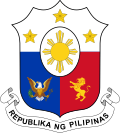| Party | Votes | % | Seats |
|---|
| Bayan Muna | 1,708,253 | 26.19 | 3 |
| Association of Philippine Electric Cooperatives | 802,060 | 12.30 | 3 |
| Akbayan | 377,852 | 5.79 | 2 |
| Luzon Farmers Party | 330,282 | 5.06 | 1 |
| Citizens' Battle Against Corruption | 323,810 | 4.96 | 1 |
| Buhay Hayaan Yumabong | 290,760 | 4.46 | 1 |
| Anak Mindanao | 252,051 | 3.86 | 1 |
| Alyansang Bayanihan ng mga Magsasaka, Manggagawang Bukid at Mangingisda | 242,199 | 3.71 | 1 |
| Philippine Coconut Producers Federation | 229,165 | 3.51 | 1 |
| Partido ng Manggagawa | 216,823 | 3.32 | 1 |
| Sanlakas | 151,017 | 2.32 | 1 |
| Abanse! Pinay | 135,211 | 2.07 | 1 |
| Adhikain at Kilusan ng Ordinaryong Tao para sa Lupa, Pabahay, Hanapbuhay at Kaunlaran | 126,012 | 1.93 | 0 |
| Alagad | 117,161 | 1.80 | 0 |
| Senior Citizens/Elderly Sectoral Party | 106,496 | 1.63 | 0 |
| All Trade Union Congress of the Philippines | 103,273 | 1.58 | 0 |
| Maritime Party | 98,946 | 1.52 | 0 |
| Ang Bagong Bayani-OFW Labor Party | 97,085 | 1.49 | 0 |
| Aniban ng mga Magsasaka, Mangingisda at Manggagawa sa Agrikultura Katipunan | 65,735 | 1.01 | 0 |
| Alyansa ng Nagkakaisang Kabataan ng Sambayanan Para sa Kaunlaran | 63,312 | 0.97 | 0 |
| Alyansa ng may Kapansanan sa Pilipinas | 54,925 | 0.84 | 0 |
| Mindanao Federation of Small Coconut Farmers Organization | 49,914 | 0.77 | 0 |
| Womenpower | 46,831 | 0.72 | 0 |
| Aggrupation and Alliance Farmers and Fisherfolks of the Phils. | 43,882 | 0.67 | 0 |
| All Workers Alliance Trade Unions | 42,149 | 0.65 | 0 |
| National Confederation of Tricycle Operators and Driver's Association of the Phils. | 38,898 | 0.60 | 0 |
| National Federation of Small Coconut Farmers Organization | 37,470 | 0.57 | 0 |
| Tribal Communities Association of the Philippines | 35,807 | 0.55 | 0 |
| Pilipinong May Kapansanan | 32,151 | 0.49 | 0 |
| Veterans Care and Welfare Organization | 31,694 | 0.49 | 0 |
| Union of the Filipino Overseas Workers | 29,400 | 0.45 | 0 |
| Pilipino Workers Party | 24,182 | 0.37 | 0 |
| Democratic Alliance | 24,029 | 0.37 | 0 |
| Philippine Association of Retired Persons | 23,297 | 0.36 | 0 |
| Alliance of Retired Postal Employees and Senior Citizens | 22,497 | 0.34 | 0 |
| Agrarian Reform Beneficiaries Association | 22,345 | 0.34 | 0 |
| Federation of Jeepney Operators and Drivers Association of the Phils. | 21,335 | 0.33 | 0 |
| Gabay ng Manggagawang Pilipino Party | 17,777 | 0.27 | 0 |
| Alternative Approaches of Settlers Advocacy for the Holistic Advancement of the Nation Party | 16,787 | 0.26 | 0 |
| Alliance for Youth Solidarity | 15,871 | 0.24 | 0 |
| Party for Overseas Workers and Empowerment and Re-Integration | 13,050 | 0.20 | 0 |
| Kilos Kabataang Pilipino | 11,170 | 0.17 | 0 |
| Kaloob-Ka Isang Loob para sa Marangal na Paninirahan | 9,137 | 0.14 | 0 |
| Alyansa ng Mga Mamamayan at Magdaragat Sa Lawa ng Laguna | 7,882 | 0.12 | 0 |
| Partido Katutubong Pilipino | 6,602 | 0.10 | 0 |
| Development Foundation of the Philippines | 6,600 | 0.10 | 0 |
| Total | 6,523,185 | 100.00 | 17 |
|
| Valid votes | 6,523,185 | 22.13 | |
|---|
| Invalid/blank votes | 22,951,124 | 77.87 | |
|---|
| Total votes | 29,474,309 | – | |
|---|
| Registered voters/turnout | 36,271,782 | 81.26 | |
|---|
| Source: Supreme Court (G.R. No. 147589); COMELEC (Canvass report (archived)) |


